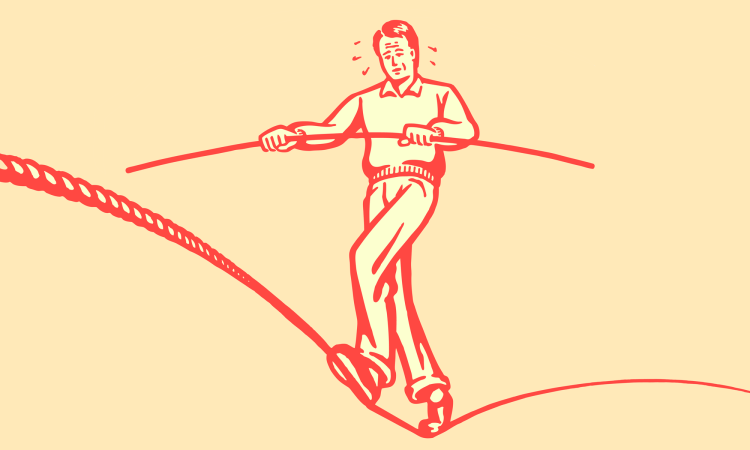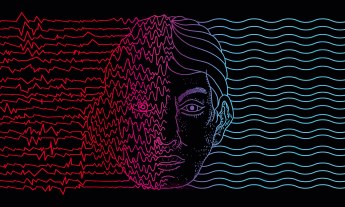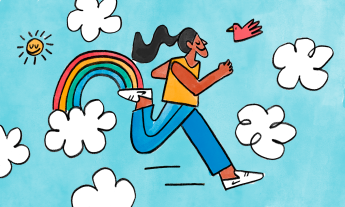
Psychologist Kelly McGonigal used to demonize stress, warning patients that stress can increase the risk of a wide variety of ailments. Then, research changed her mind.
Health psychologist Kelly McGonigal (TED Talk: How to make stress your friend) explored a startling research finding in her TED Talk: Stress may only have negative health consequences if you believe that it will. Her radical suggestion? Instead of fearing stress, befriend it. To learn more about why some stress may have positive effects on our minds and bodies, read the seven studies listed below. (Important: all these studies are about “acute,” “short-term” or “moderate” stress — the kind that is short-lived and related to something specific. “Chronic stress,” on the other hand, isn’t quite so great.)
1. Stress correlates to a lower risk of death (if you think about it in the way that McGonigal suggests). In her talk, McGonigal references a study done by researchers at the University of Wisconsin-Madison. Researchers looked at data from a 1998 survey conducted by the National Center for Health Statistics that asked specific questions about stress levels, stress management and perceptions about how stress affects health. They used a sample of about 29,000 respondents from the survey who matched up to public records, and then looked at instances of death among survey respondents through 2006. Overall, they found that survey respondents who reported a lot of stress and a perception that stress has a big impact on health had an increased hazard ratio — which converted to a 43% increased risk of premature death. However, survey respondents who reported a lot of stress but little to no perception that stress impacted health had the lowest hazard ratio of any group in the survey, even those who felt almost no stress.
2. Stress boosts the production of neurons that may improve performance. A 2013 study from Daniela Kaufer and Elizabeth Kirby at the University of California, Berkeley, suggests why some stress can propel you forward and enable you to meet a challenge. These scientists put rats in a stressful situation — they immobilized them in their cages to boost the levels of stress hormone in their bodies. In the brain, this boost appeared to cause stem cells to grow into new neurons. Two weeks later, these matured neurons appeared to improve the rats’ performance on learning tests. “Some amounts of stress are good to push you just to the level of optimal alertness, behavioral and cognitive performance,” explains Kaufer. “I think intermittent stressful events are probably what keeps the brain more alert, and you perform better when you are alert.”
3. Bursts of stress may strengthen the immune system. This TEDx Talk (The positive effects of stress) gives an easy-to-follow explanation of Firdaus Dhabhar’s research out of Stanford University. The gist: short-term stress causes the adrenal glands to release hormones that, essentially, call immune cells from where they “rest” in the organs and move them to the “battle stations” where they’ll be needed — even before there’s a wound or infection. (Read the study, published in Psychoeuroendocrinology.)
4. Stress can make you more social. A 2012 study by researchers at the University of Freiburg suggests that stress can help you make friends. For this study, 72 male students were divided into a stress condition and a control condition. In the stress condition, the students had to go through an ordeal very similar to the research subjects in #3. (This sequence of events is called the “Trier social stress test.”) From there, each participant was paired off with a partner to play a group of games that tested them on trust, sharing and risk-taking. In the end, the researchers found that students in the stress condition exhibited more prosocial behaviors in the games. In other words, they were more willing to trust their partner and showed a greater propensity to share.
5. Stress can improve learning. A study in the journal Nautrwissenschaften looked at how male spotted bowerbirds learn new sounds, and concluded that the species showed enhanced learning capabilities during moments of acute stress. But this finding isn’t just for the birds. A 2007 study from researchers at the National Institute of Mental Health subjected half its male participants to something sure to stress them out — having their hand dunked in ice-cold water for 60 seconds. After that, they were asked to do two learning experiments often conducted in animals — an eyeblink test and a virtual navigation test. The subjects in the stress group performed far better on both tests.
6. Stress may improve memory. Rats, apparently, hate swimming. Researchers at the University of Buffalo used this fact to help them with an experiment in 2009. They forced one group of rats to take a 20-minute swim while another group stayed dry — then they measured how both groups performed in a maze. In trials four hours and one day later, the rats who’d gone on the stressful swim made significantly fewer mistakes in the maze than the control group. The researchers noted that these rats had an increase in the neurotransmitter glutamine, known to improve working memory. A more recent study looked at the interplay between stress and working memory in human beings. Researchers at New Mexico State University gave students a test where they looked at nearly identical images in rapid succession and had to note subtle differences between the two. They did a version of this test both before and after a situation specifically designed to spike their cortisol levels. After the stressful situation, students did better on the working-memory test.
7. Stress may help you connect with your instincts. Researchers at the University of Maine were curious to see how exactly stress improves performance. So they put a group of students through a series of tests known to spike cortisol levels — they had to give a 5-minute, videotaped presentation, do a 5-minute interview and then count backwards from 1,022 in steps of 13, all in front of judges whose expression stayed flat throughout. After this, the students performed two tasks around categorizing circles and bars on a computer screen. In the first, they had to talk through specific rules to categorize the shapes. In the second, they simply had to share which category they thought the shape belonged in. The more stressed-out the subjects reported feeling, the better they did on the second task — the one that required them to worry less about the details and go with their gut.

















